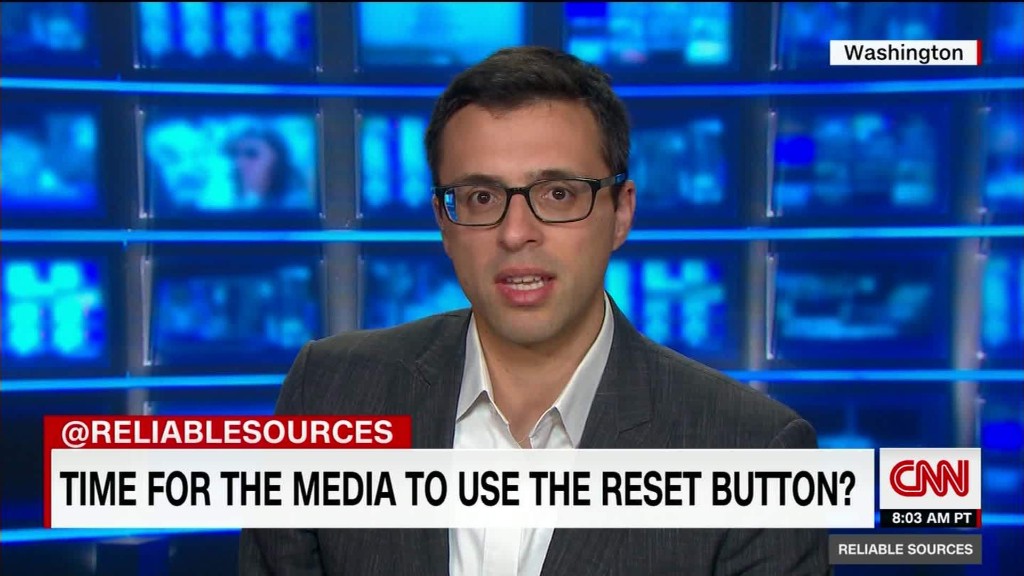
It hasn't quite been a month since Donald Trump's extraordinary victory over Hillary Clinton, and newsrooms have already had to repeatedly confront the unique coverage challenges posed by the president-elect.
One of the biggest dilemmas created by Trump came into focus once again on Sunday, when he took to Twitter to falsely claim that he won the popular vote over Clinton "if you deduct the millions of people who voted illegally."
Reporters raced to their computers to file stories on Trump's latest outlandish claim, and many of the headlines and tweets that resulted neglected to make clear that he was peddling an erroneous conspiracy theory.
One widely criticized headline and tweet came courtesy of CBS News, which originally included the quote unchallenged. CBS later updated the headline and sent out a subsequent tweet to note that Trump cited "no evidence."
"TV has invented something even lower than stenography-journalism: tweet-quoting as journalism," the media critic Jeff Jarvis said of CBS's original headline. "Lazy, damaging, unjournalistic."
The Wall Street Journal on Monday led its front page with a story on Trump's tweets. Neither the Journal's headline nor the lede mentioned the fact that Trump's assertion was baseless, although the story did note in the third paragraph that "there is no evidence of widespread voting by illegal immigrants or others ineligible to vote." But many critics would argue that the third paragraph is too low for such a crucial detail, particularly for the scores of readers who give stories only a cursory skim.
CNN's article on Trump's tweet identified his claim as false and baseless in both the headline and opening paragraph. A tweet from CNN, which said that Trump "alleges he would have won popular vote if 'millions of people' hadn't voted illegally for Hillary Clinton," has been criticized, however.
The coverage, and the ensuing controversy over it, was a reminder that the impending Trump presidency has already sent journalists into uncharted territory.
While most elected officials, including President Obama, are active on Twitter, few use the platform as prolifically as Trump, whose tweets have been known to include blatant falsehoods and conspiracy theories.
The newsworthiness of Trump's tweets has been at the center of a spirited debate among reporters and media observers in the aftermath of his Election Day upset. Is it news -- to use a recent example -- if Trump publicly chastises the cast members of the biggest hit on Broadway? If so, how much coverage is appropriate?
It was hard to find a consensus on those questions this month, after Trump used Twitter to scold the stars of "Hamilton" for making a statement directed at Vice President-elect Mike Pence when he attended the show.
On Sunday, Hamiltongate gave way to Headlinegate, but the underlying questions for journalists remained the same.
"Newsrooms need to come to grips with a soon-to-be-president who can distract and distort with Twitter megaphone," tweeted the Huffington Post's Michael Calderone, who reported Sunday on the news outlets that too-credulously reported Trump's illegal voting claim.
The claim that Clinton's lead in the popular vote has been driven by "millions of people who voted illegally" has been promoted by fringe news sites such as Infowars.com, whose founder, Alex Jones, was a vocal supporter of Trump.
Jones, a fiery conspiracy theorist whose claims that the 9/11 attacks were an inside job typically make him radioactive to mainstream politicians, interviewed Trump last year.
The illegal voting claim appears to have been first pushed by Gregg Phillips, a conservative activist with more than 26,000 Twitter followers.
Three days after the election, Phillips tweeted that his analysis of voter registrations found that the "[n]umber of non-citizen votes exceeds 3 million."
"Consulting legal team," Phillips added. His tweets promoting the claim have been shared thousands of times. As the Washington Post's fact-checker Glenn Kessler noted, Phillips made the claims "even before data on voter history was actually available in most jurisdictions."
A scenario like this one is something that many reporters and editors did not anticipate confronting beyond November 8, when much of the media world expected Hillary Clinton to win the election and relegate Trump to a less public role after more than a year of dominating headlines.
Now Trump's tweets, previously directed at the likes of Rosie O'Donnell and Tom Brady, potentially carry far-reaching implications of global consequence -- at least in theory. Trump's election is already challenging the notion that everything a president does is by its definition newsworthy, as well as the merits of filing stories as quickly as possible in search of web traffic. And the way he operates shows how easily those two tendencies by the media leave it open to being exploited.
Trump and many of his supporters have treated his victory as a referendum on the news media. Many Trump critics, meanwhile, view his victory as a harsh indictment of the media's coverage of a candidate who kept fact-checkers particularly busy this election cycle.
The reporting on the illegal vote claim provided more reasons to complain for the latter group, but Trump's win was also a humbling sign for journalists. As a candidate, Trump faced repeated fact-checks and deeply reported investigations that turned up damning findings -- and he won anyway.
"Soul-searching in the media is good and necessary," tweeted BuzzFeed's McKay Coppins. "But it's also possible that press could have been 'perfect' and Trump still would've won."
It was a preview of what the next four years could have in store: Trump grabbing headlines with a tweet to his millions of followers, while journalists and other media types use the platform to debate how to respond.


